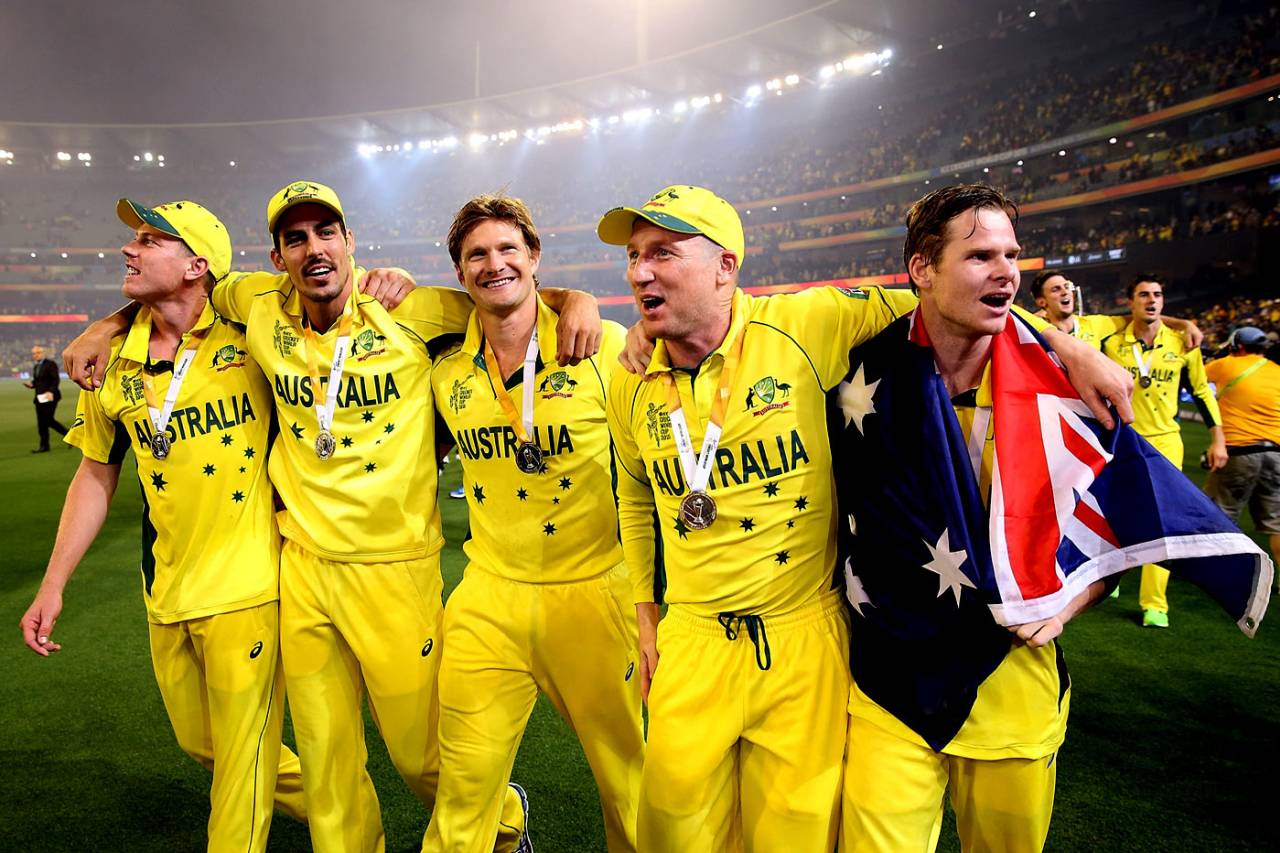What did we learn from this World Cup?
That there is a place for proper batsmanship in ODIs, that New Zealand punch above their weight, and that taking wickets wins you matches

The nation of domination: Australia have won four of the last five World Cups • ICC
Yes. Australia were worthy, deserving and engaging winners. The astonishing feature of Australian cricket is how quickly it bounces back. In the 2013 Ashes, Australia looked, well, un-Australian. Eighteen months later, it feels as though the old order, default Australian dominance, has been restored.
Not on this evidence. South Africa played with big-hearted ambition and spirit. In the epic semi-final against New Zealand, South Africa, despite making costly mistakes, left everything they had out on the pitch.

The thinking fan keeps two questions in his head simultaneously. The first is: "Who is winning?" and the second is: "Who ought to be winning?" That "ought" does not imply a moral sense of entitlement but a practical grasp of the facts. A more populous, richer sporting nation, with more talent at its disposal, "ought" to beat a poorer, smaller and less cricket-focused nation. If Luxembourg draw 1-1 with Spain in football, it is a good result for Luxembourg and a shocking outcome for Spain.
This is an easy one, I'm afraid. Given its wealth, population, talent base and resources, England ought to be perennial high achievers on the international stage. Far from it. Instead, England are stuck playing a brand of cricket that simply cannot cut it in the modern era. The average strike rate at this World Cup was 89 runs per 100 balls (up from 62 in 1992); 270 from 50 overs, in other words, is merely par for the course. It was disheartening to hear Eoin Morgan, after England's exit, saying the plan had been "to fight" through to the knockout stage. How about "playing" to the quarter-final instead? Were Morgan's attacking instincts - usually so much more positive and expressive than the phrase he used - dulled by the cricketing culture surrounding him?

Absolutely not. The Associates produced plenty of good cricket and some thrilling matches. Cricket needs to expand, not retract. Cricket is routinely described as the world's second-favourite team sport. But the game still faces a stern challenge to retain and expand its position within world sport. We need new faces, different voices and fresh cricketing cultures. While Australia deserve high praise for their resilient and positive cricketing culture, the fact that they have won four of the last five World Cups underlines the need to encourage new international teams. All sports, to a degree, rely on uncertainty and surprise. It won't suit anyone, even Australia, if dominance morphs into monopoly.
For all the talk of oversized bats and undersized grounds, it was a bowler, Mitchell Starc, who set the tone in the final. The counter-intuitive lesson of this World Cup is that the surest way - perhaps the only way - to stop devastating power-hitting is not canny containment but by fighting fire with fire. Take wickets or get smashed: that is the executive summary.
Definitely. David Warner's mindset might be ultra-positive, but the basics of his technique are absolutely sound. Alongside explosive power, Warner's game is also balanced, compact and uncomplicated. The challenge for selectors around the world is not to elevate sloggers who can bully bad teams but to identify proper batsmen with the potential to add new gears to their existing game. England, for example, should be looking to develop batsmen such as Alex Hales, who is capable of hitting good balls for four with relatively little risk. In the final, both Michael Clarke and Steven Smith showed real defensive skill and aptitude as well as flair and aggression.

Brendon McCullum, so often the most aggressive of captains, did blink once during the final. When he moved second slip out of the cordon, Warner inevitably edged the very next ball. Ross Taylor dived across from first slip in vain; the ball would have travelled straight to second. Rather than blaming McCullum, we might reflect that some situations are so difficult, the odds so heavily stacked against you, that all the options look unappealing. Keeping the field up looks like suicide. But pushing the field out seems like merely prolonging the agony.
Ed Smith's latest book is Luck - A Fresh Look at Fortune. @edsmithwriter